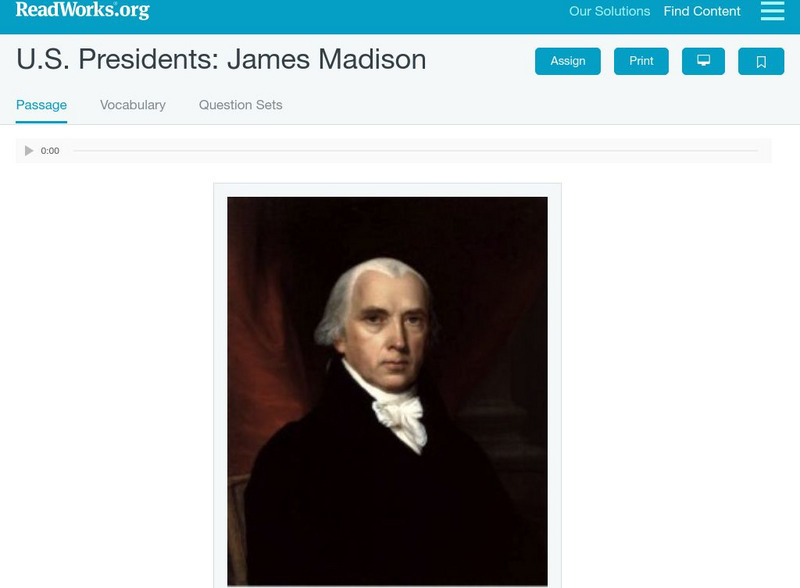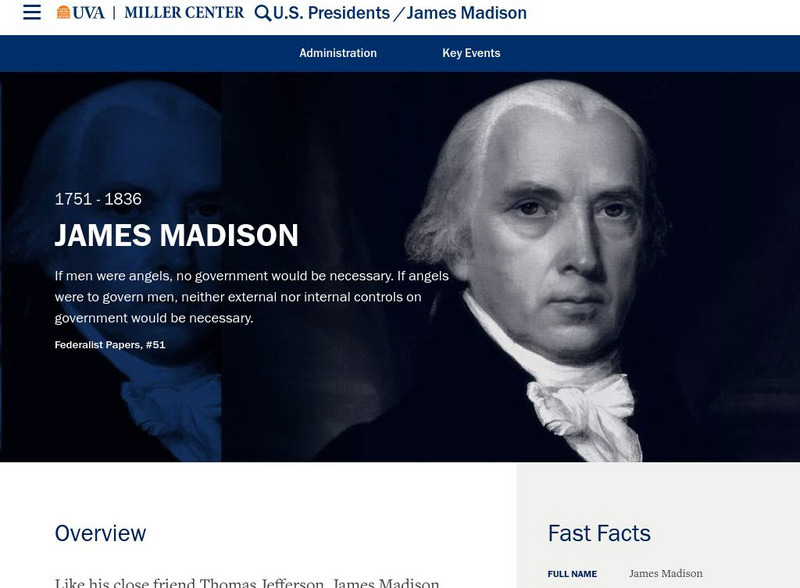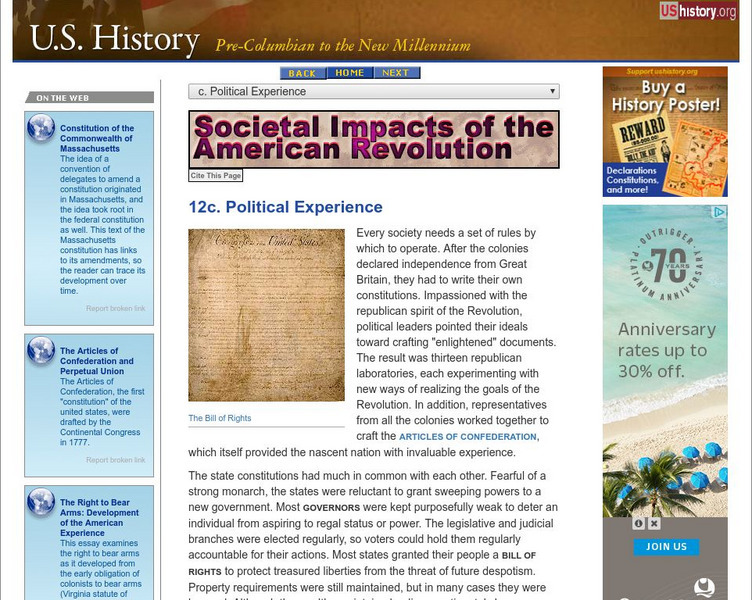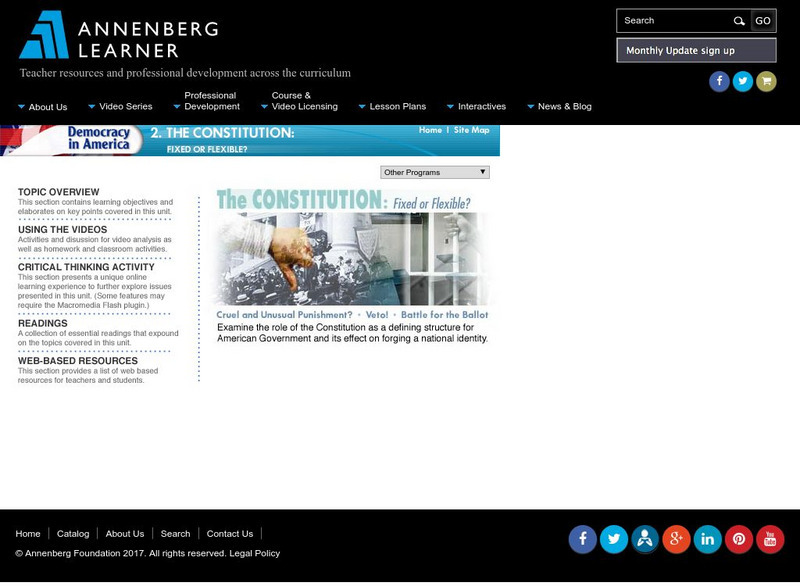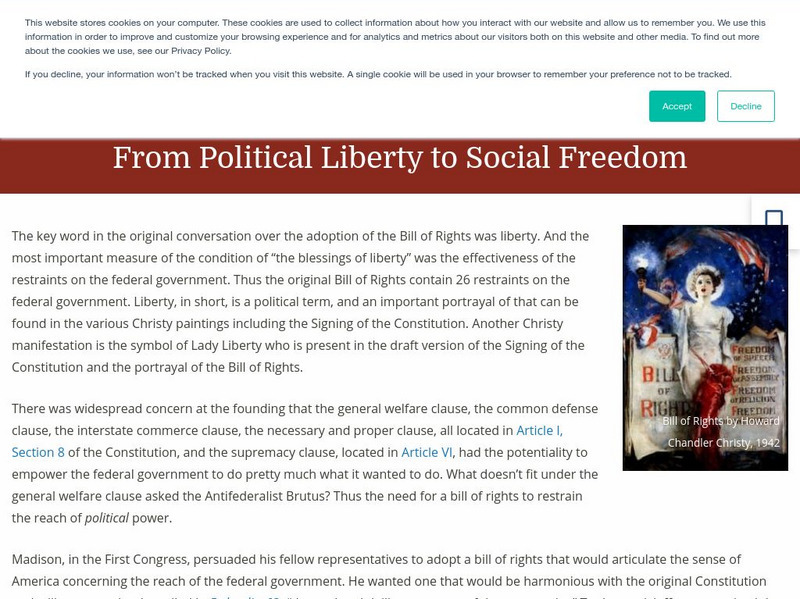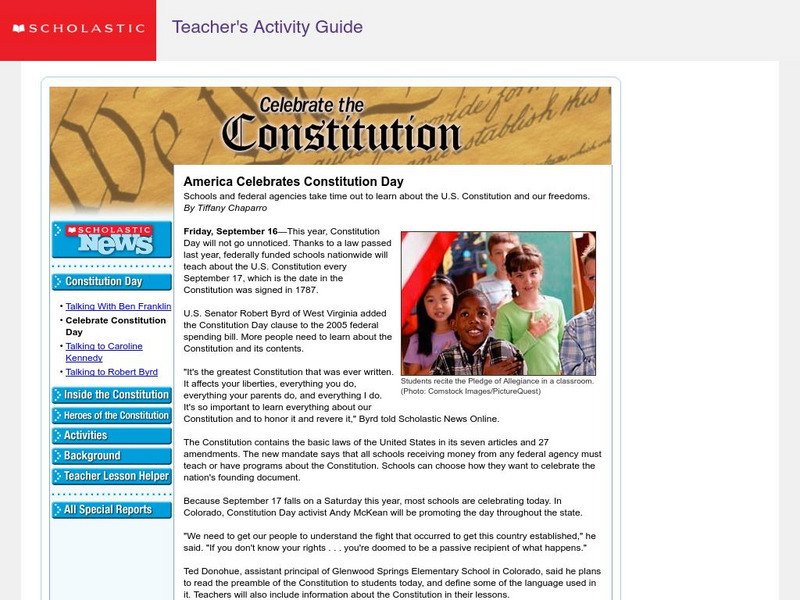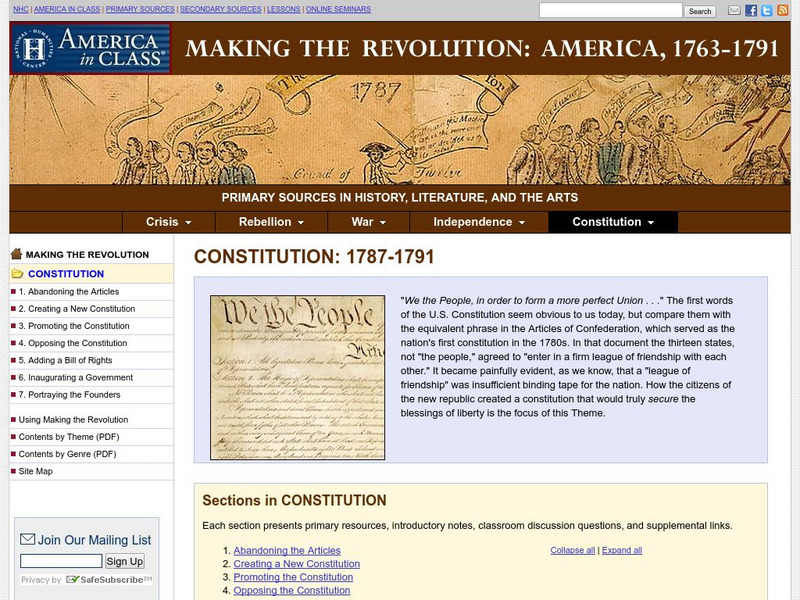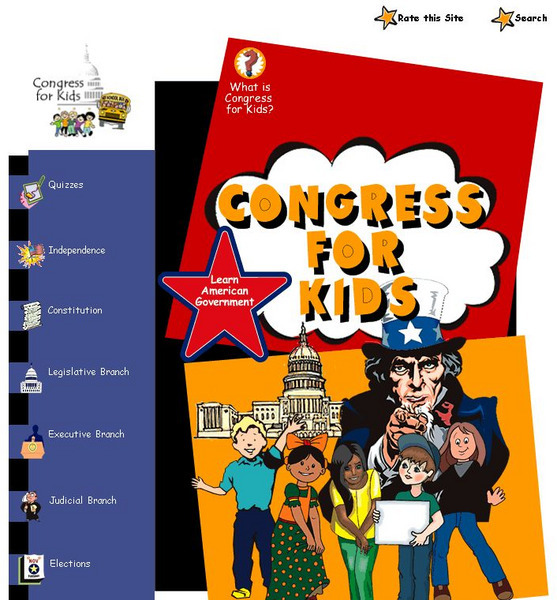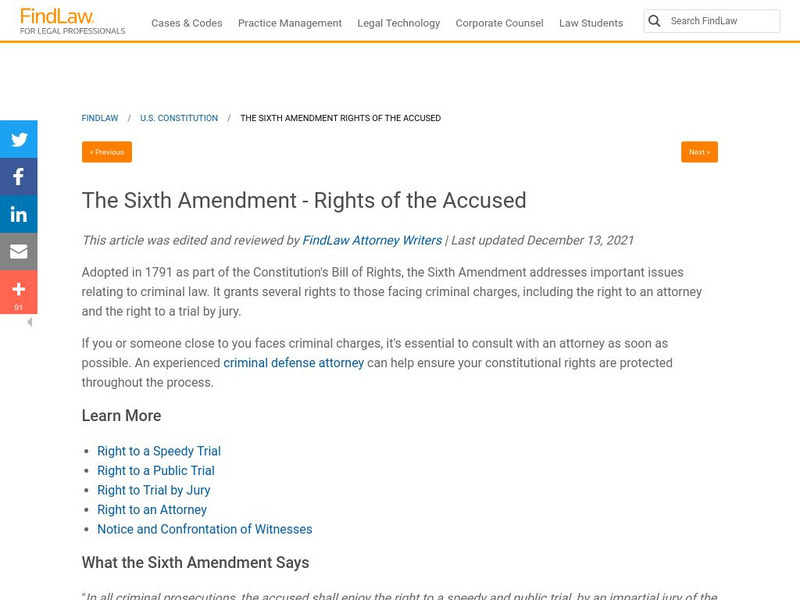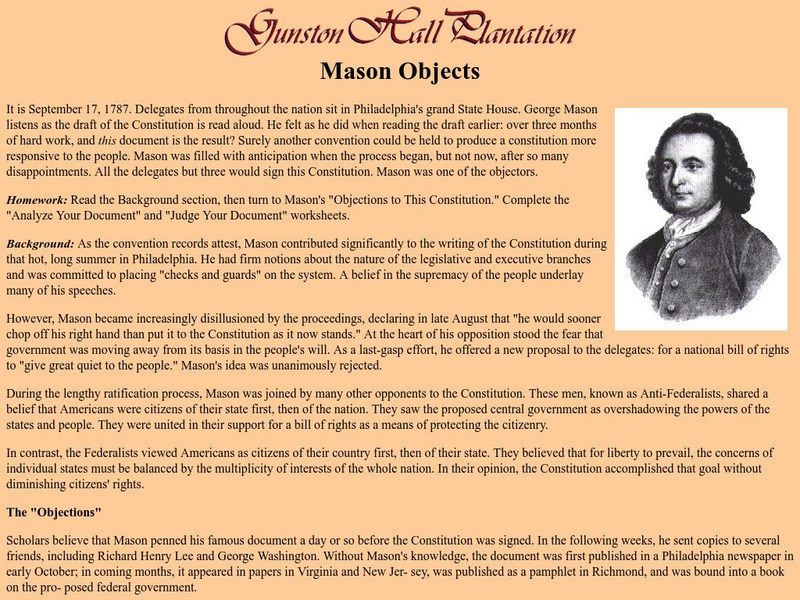Read Works
Read Works: u.s. Presidents James Madison
[Free Registration/Login Required] An informational text about James Madison, the fourth President of the United States. A question sheet is available to help students build skills in reading comprehension.
Bill of Rights Institute
Bill of Rights Institute: Constitution Quiz: Constitution Duel
Challenge friends to a duel! As you take this quiz you will be asked to answer 10 multiple-choice questions in this knowledge duel to defend your constitutional honor. Questions will come from categories such as the Constitution, primary...
University of Virginia
Miller Center at Uva: u.s. Presidents: James Madison
The Rector and Visitors of the University of Virginia provides an extensive biography on the life of James Madison. Provides information about his life before and after the presidency as well as his policies on foreign and domestic...
Independence Hall Association
U.s. History: The Antifederalists' Victory in Defeat
By 1788 eleven states ratified the Constitution, more than enough to put it into effect as the document establishing rules for the nation. Read about the goals of the Federalists in estabilishing a national government and find out how...
Independence Hall Association
U.s. History: Political Experience
Read about how the state governments in the new American nation served as the laboratory to try out new ideas of governing and treating citizens. See how remarkably similar the ideas put forth in state constitutions were to each other.
Thomson Reuters
Find Law: U S. Constitution: Annotation 18: First Amendment
Information about the boundaries of seditious speech and the permissibility of governmental measures which are directly concerned with the content of expression.
Thomson Reuters
Find Law: u.s. Supreme Court: De Jonge v. State of Oregon (1937)
This resource provides a summary of the case De Jonge v State of Oregon.
PBS
Pbs News Hour: Constitutional Amendments and Gay Marriage
In this lesson, learners examine and debate the issue of same sex marriage by studying background information, news articles, legal arguments and the 14th Amendment to the U.S. Constitution. They then draft an amendment of their own to...
US National Archives
Nara: Charters of Freedom: Constitution of the United States
Comprehensive overview of the U.S. Constitution. Places the Constitution in context with two other founding charters of American democracy and government, the Declaration of Independence and the Bill of Rights. Includes access to digital...
US National Archives
National Archives and Records Administration: America's Founding Documents
Original founding documents supported by explanations and articles. Includes the Declaration of Independence, the U.S. Constitution, and the Bill of Rights.
Annenberg Foundation
Annenberg Learner: Democracy in America: The Constitution: Fixed or Flexible?
This unit explores the timeless qualities of The U.S. Constitution, the opportunities to amend it, and how it is a pillar of the American identity, through these activities, videos, and outside resources.
Teaching American History
Teaching American History: From Political Liberty to Social Freedom
In the early stages of the new nation's government the members of Congress sought to protect the citizens from political tyranny. Social freedoms emerged in the twentieth century when FDR begged for economic protection of U.S. citizens.
Scholastic
Scholastic: Constitution Game
This game is all about the U.S. Constitution. Click start and drag the item where it belongs in the Constitution. The resource contains links to learn more about the Constitution.
Annenberg Foundation
Annenberg Classroom: Our Constitution: Second Amendment (1791)
Text and summary of the 2nd Amendment to the U.S. Constitution. Site includes a timeline as well as a link to a second timeline that has hyperlinks to additional information.
Constitutional Rights Foundation
Constitutional Rights Foundation: Puerto Rico: Commonwealth, Statehood, or Independence?
Activity in which students read informational text on the the history of Puerto Rico as a territory of the United States, and then decide on the political status of Puerto Rico. Individual, group and class work. Links to list of resources.
National Humanities Center
National Humanities Center: America in Class: Making of a Revolution: Constitution, 1787 1791
Seven sections of primary resource materials with introductory notes, classroom discussion questions, and supplemental links on the questions, discussion and debate over the U.S. Constitution.
The Dirksen Congressional Center
Congress for Kids
Take a tour of the federal government with Uncle Sam and learn the story of the Declaration of Independence, the Constitution, the three branches of government, and elections. Along the way learn how laws are made, about the Bill of...
Thomson Reuters
Find Law: u.s. Constitution: Sixth Amendment
This resource contains the text of the 6th amendment. It has several pages of annotations covering the major concepts in the rights of the accused.
Other
Gunston Hall Plantation: Mason Objects
In this set of activities, students learn what George Mason's objections were to the U.S. Constitution. They then evaluate them through a class discussion and divide into groups to hold a debate about the disagreement between the...
Other
Senate Bill a Step Backwards for Immigrant Rights
This article examines a recent bill debated in the U.S. Senate regarding immigration and border policy.
Independence Hall Association
U.s. History: Radical Reconstruction
Read about the frustration the Radical Republicans in Congress had with the Reconstruction plans of Andrew Johnson. Find out what legislation they were able to pass over Johnson's veto, and how they attempted to protect emancipated...
Other
Gunston Hall Plantation: Discover George Mason
Lesson plans, activities, and resources for learning about George Mason and his contributions to Virginia statehood and in forging the U.S. Constitution and Bill of Rights.
iCivics
I Civics: Federalists & Anti Federalists
Look at the debate and eventual compromise, between the Federalists and Anti-Federalists that occurred around the creation of the U.S. Constitution.
Constitutional Rights Foundation
Constitutional Rights Foundation: Centralized vs. Decentralized Rule: The Articles of Confederation
Activity comparing the Articles of Confederation to the Constitution. Using a variety of articles, students research and create a chart with explanations and critical comparisons of the two governing documents.


